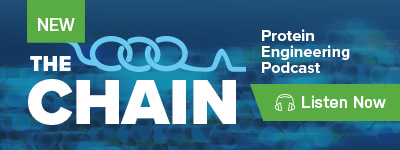EXPRESSION STREAM
The PEGS Virtual Expression Stream explores difficult-to-express proteins, developing successful expression strategies, mastering expression hosts, and engineering expression systems to support and enhance protein production.
Week 1: June 5 Difficult-to-Express Proteins
Week 2: June 12 Protein Production Strategies
Week 3: June 19 Optimizing Protein Expression
Week 4: June 26 Engineering Expression Systems
DIFFICULT-TO-EXPRESS PROTEINS
FRIDAY, JUNE 5 | 10:00 AM - 1:15 PM (ET)
The intrinsic nature of proteins tends to make them ‘difficult’ to produce. The Difficult-to-Express Proteins session examines the challenges researchers encounter when striving for high-yield production of “difficult-to-express” proteins (DTEPs), and the strategies and technologies that have proven successful. Along with proven methods, the meeting examines the notoriously difficult membrane proteins, and investigates some emerging tools that are proving helpful in determining structure, leading to success in handling proteins that are difficult to express.
10:00 Chairperson's Opening Remarks
Anupam Singhal, PhD, Technology Development, Berkeley Lights, Inc.
10:10 Keynote Presentation: Strategies for Optimizing Challenging-to-Express Protein Targets
 Rana Sidhu, PhD, Protein Expression Lead, Early Solutions, UCB, Inc.
Rana Sidhu, PhD, Protein Expression Lead, Early Solutions, UCB, Inc.
10:45 Nanoparticles to Support Functional Assessment of Membrane Proteins that are Produced De Novo in Cell-Free Reactions
 Matthew Coleman, PhD, Senior Scientist & Group Leader, Biosciences and Biotechnology Division, Lawrence Livermore National Laboratory
Matthew Coleman, PhD, Senior Scientist & Group Leader, Biosciences and Biotechnology Division, Lawrence Livermore National Laboratory
 11:30
Rapid Generation of Production Cell Lines with Superior Titers and >99% Monoclonality for Complex Antibody Molecules
11:30
Rapid Generation of Production Cell Lines with Superior Titers and >99% Monoclonality for Complex Antibody Molecules
 Tanner Nevill, PhD, Vice President, Program Management, Berkeley Lights
Tanner Nevill, PhD, Vice President, Program Management, Berkeley Lights
Development of next-generation therapeutics requires generation of production cell lines secreting a wide range of complex antibody formats. We will demonstrate how the Beacon® system enables rapid generation of cell lines secreting traditional and non-traditional antibody molecules. Cell lines are generated with >99% monoclonality assurance in <1 week, removing multiple lengthy rounds of cloning. Case studies will show how Beacon users rapidly generate cell lines with titers superior to clones selected with alternative CLD methods.
11:50 Refreshment Break
11:55 Integrating Vibrio Natriegens into a Protein Production Workflow
 William Gillette, PhD, Principal Scientist, Protein Expression Laboratory, Frederick National Laboratory for Cancer Research
William Gillette, PhD, Principal Scientist, Protein Expression Laboratory, Frederick National Laboratory for Cancer Research
12:35 Interactive Q&A Session with Speakers and Audience
1:05 Close of Day
PROTEIN PRODUCTION STRATEGIES
FRIDAY, JUNE 12 | 10:00 AM - 1:15 PM (ET)
The expanding development of biologics puts ever-growing pressures on protein scientists to boost productivity while ensuring quality. Developing an overarching strategy that leads to successful outcomes is crucial. The Protein Production Strategies session features protein leaders who share their insights and expertise based on real-world experience for developing plans and procedures that ensure quality products while streamlining timelines and cost in an effort to meet industry’s increasing demands.
10:00 Chairperson's Opening Remarks
Lars Stöckl, PhD, Senior Director, R&D, Glycotope GmbH
10:10 Keynote Presentation: Overview of a High-Throughput Pipeline for Streamlining the Production of Recombinant Proteins for Structural Biology
 Raymond J. Owens, PhD, Professor, Research Complex at Hartwell & Rosalind Franklin Institute, University of Oxford
Raymond J. Owens, PhD, Professor, Research Complex at Hartwell & Rosalind Franklin Institute, University of Oxford
10:45 Cell and Process Optimization Strategies to Improve Biologics Manufacturing
 Stefan R. Schmidt, PhD, MBA, COO, Head, Operations, BioAtrium AG
Stefan R. Schmidt, PhD, MBA, COO, Head, Operations, BioAtrium AG
 11:25 Using Specific Productivity Optimization Technology During Cell Line Development to Achieve High Titres
11:25 Using Specific Productivity Optimization Technology During Cell Line Development to Achieve High Titres
 Louis Boon, PhD, CSO, Biologics, Polpharma Biologics
Louis Boon, PhD, CSO, Biologics, Polpharma Biologics
Innovative cell line and early process development are critical to generate a high producing cell lines alongside a USP strategy to meet high quality standards. Improving productivity is often done by increasing VCD during USP, however this results arduous clarification and elevated HCPs. Therefore, we developed our SPOT™ technology to increase the cell line specific productivity (Qp) which facilitate high volumetric productivity at low VCD accompanied with a simple and efficient DSP process
11:50 Refreshment Break
11:55 Protein Science at AstraZeneca
 Saleha Patel, PhD, Senior Research Scientist, Protein Science, Discovery Biology, AstraZeneca
Saleha Patel, PhD, Senior Research Scientist, Protein Science, Discovery Biology, AstraZeneca
12:35 Interactive Q&A Session with Speakers and Audience
1:05 Close of Day
OPTIMIZING PROTEIN EXPRESSION
FRIDAY, JUNE 19 | 10:05 AM - 12:45 PM (ET)
Expression of heterologous proteins presents many challenges and understanding expression systems is key. The Optimizing Protein Expression session delves into protein expression by examining and enhancing expression systems, including CHO, E. coli, and baculovirus. What is the best expression system for expressing your protein of choice? Ease and cost of scale-up must be considered to ensure successful bottom-line results. Experts will share case studies and disclose data, while divulging details of expression systems’ underlying mechanisms.
10:05 Chairperson's Opening Remarks
Richard Altman, MS, Field Application Scientist, Life Science Solutions, Thermo Fisher Scientific
10:10 Keynote Presentation: The MultiBac System: A Perspective
 Imre Berger, PhD, Director, Max Planck Centre for Minimal Biology, the University of Bristol
Imre Berger, PhD, Director, Max Planck Centre for Minimal Biology, the University of Bristol
10:45 Large-Scale Synthetic Human Phosphoproteomes to Decode Novel Protein-Protein Interaction Networks in E. coli
 Jesse Rinehart, PhD, Associate Professor, Cellular & Molecular Physiology, Systems Biology Institute, Yale University School of Medicine
Jesse Rinehart, PhD, Associate Professor, Cellular & Molecular Physiology, Systems Biology Institute, Yale University School of Medicine
 11:20 High Density (HD) Expression Platform: The One-Stop-Solution for Recombinant Antibody Production
11:20 High Density (HD) Expression Platform: The One-Stop-Solution for Recombinant Antibody Production
 Bowu Luan, Product Manager, GenScript USA, Inc.
Bowu Luan, Product Manager, GenScript USA, Inc.
GenScript has developed a novel reagent “Cocktail” compatible with HD expression system, which
improves antibody yield by increasing cell viability and facilitating protein folding. This HD system
works well with all species and low expressers, readily to scale down and up. Automatic workflow from
transfection to purification ensures the quality.
11:30 Refreshment Break
11:35 Engineering CHO Cells for Optimal Glycosylation and Robust Bioprocesses
 Bjørn Voldborg, MSc, Director, CHO Cell Line Development, The Novo Nordisk Foundation Center for Biosustainability, Technical University of
Denmark
Bjørn Voldborg, MSc, Director, CHO Cell Line Development, The Novo Nordisk Foundation Center for Biosustainability, Technical University of
Denmark
12:15 Interactive Q&A Session with Speakers and Audience
12:45 Close of Day
ENGINEERING EXPRESSION SYSTEMS
FRIDAY, JUNE 26 | 10:00 AM - 1:15 PM (ET)
The Engineering Expression Systems session examines the functioning of the cellular machinery harnessed during protein biosynthesis, and how to engineer hosts to efficiently express a protein of interest. Breakthrough technologies that support engineering will be disclosed along with an examination of the intricate steps required to achieve properly folded protein. Protein experts will discuss their ongoing research to engineer host cells to control quality, enhance productivity, and innovate the field of protein expression.
10:00 Chairperson's Opening Remarks
Alan Dickson, PhD, Professor, Biotechnology & Director, Ctr of Excellence in Biopharmaceuticals, the University of Manchester
10:10 Keynote Presentation: Efficacious Gene Editing & Genome Surveillance in Chinese Hamster Ovary Cells
 Steven Huhn, PhD, Senior Scientist, Process Development, Merck Research Labs
Steven Huhn, PhD, Senior Scientist, Process Development, Merck Research Labs
10:50 A Novel Post-Transcriptional Cell Selection Strategy for Rapid Clone Development and Stability Screening
 Susan Sharfstein, PhD, Professor, Nanobioscience, Nanoscale Science and Engineering, SUNY Polytechnic Institute
Susan Sharfstein, PhD, Professor, Nanobioscience, Nanoscale Science and Engineering, SUNY Polytechnic Institute
 11:30 Automated Expression Screening: from Plasmid DNA to Protein Purification with PhyTip Columns
11:30 Automated Expression Screening: from Plasmid DNA to Protein Purification with PhyTip Columns
 Lee Hoang, PhD, Director of R&D at Biotage, Biomolecules, PhyNexus Part of Biotage
Lee Hoang, PhD, Director of R&D at Biotage, Biomolecules, PhyNexus Part of Biotage
PhyNexus technology for small-scale purification of proteins and antibodies is particularly amenable to expression screening. Fully automated PhyTip columns are used for purification of 96 plasmid DNA constructs, which are suitable for small scale transient transfection of mammalian and insect cells or transformation of yeast and E. coli. The proteins from these expressions can then be purified by automated PhyTip columns to complete the screen, because expression is only valuable if the protein is purifiable.
12:00 Refreshment Break
12:05 Development and Applications of Universal Platforms for Genetic Code Expansion
 Abhishek Chatterjee, PhD, Assistant Professor, Chemistry, Boston College
Abhishek Chatterjee, PhD, Assistant Professor, Chemistry, Boston College
12:45 Interactive Q&A Session with Speakers and Audience
1:15 Close of Day














